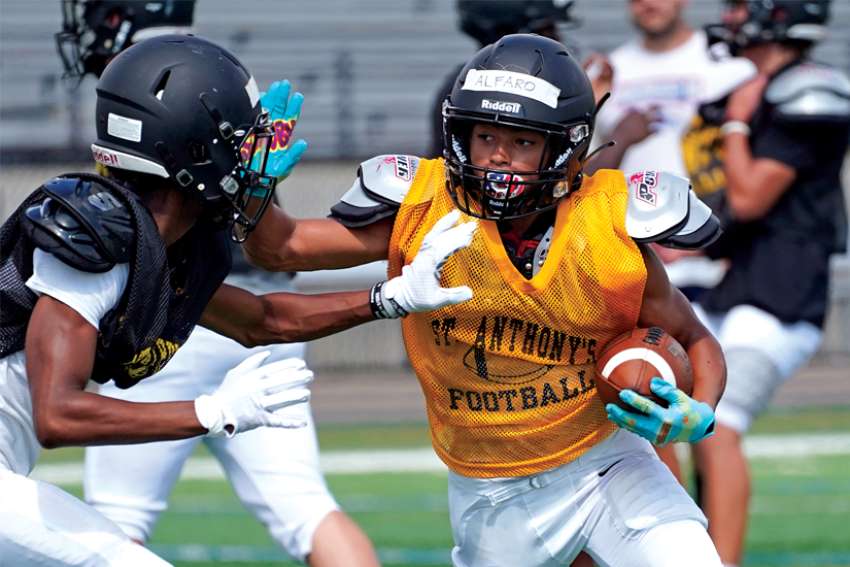Chaplain at St. Marguerite d’Youville Secondary School in Brampton, Ont., Whelan began a deep dive into the health risks related to contact sport after Gene Odulio, an athlete at local St. Thomas Aquinas Catholic Secondary, collapsed on the football field in 2012. The 17-year-old athlete passed away in hospital shortly after due to a brain injury.
While death in high school football is rare, the long-term impact of repeated trauma to the head from participation in contact sport has drawn growing concern. Given the overwhelming evidence of the devastating impact the concussion-linked brain condition chronic traumatic encephalopathy (CTE) has on the mental health and overall well-being of athletes, Whelan believes continuing to offer these sports in Catholic schools is unjustified.
Symptoms of CTE can include behavioural problems, mood swings and problems with thinking. Most documented cases have involved combat sports such as football, hockey and rugby, which are contested in high schools, and boxing and mixed martial arts, which aren’t.
“If one of their arguments is people will get a scholarship, if we believe in well-being and health, then a scholarship to more of this is the last thing you want to see,” said Whelan. “I think that it’s very obvious that our sports should be for health and well-being. When they’re excessively dangerous, I think that we Catholics might want to be different.”
A document put forth by the Vatican in 2018 on the Christian perspective on sport and the human person warned of sports that cause serious harm to body. It states, “In cases where we are only recently learning about the harmful effects of a particular sport to the body, including damage to the brain, it is important for persons from all segments of society to make decisions regarding these sports that place the dignity of the human person and his or her well-being first.”
“To me the Church has spoken,” said Whelan.
In 2018 Whelan began raising concerns with Dufferin-Peel Catholic District School Board (DPCDSB) administrators on whether the benefits of these sports outweigh the risk. He has been advocating for a formal policy in line with the Vatican perspective to be put in place. The goal, he says, is to discontinue sports that could contribute to death and serious damage to the body. There is currently a concussion policy in place but none that specifically addresses CTE.
In an address to trustees in May, Whelan shared evidence of CTE’s effects. He also spoke of the apathy towards this issue due to the perceived character-building benefits of these sports despite the health risks. He also spoke of the trend in football where more affluent and educated families are choosing to protect their children from the brain damage, while marginalized communities continue to risk their children’s health in hopes of achieving a scholarship.
The board, Whelan says, committed to having a writing team over the summer prepare a document warning parents of the health risks associated with certain sports. While it’s a step in the right direction, Whelan believes offering these sports at all is unethical for Catholic places of learning.
In a statement to The Catholic Register, the DPCDSB said it would continue to take direction from the Ministry of Education and from the Ontario Physical and Health Education Association with regards to contact sports.
“As football remains a voluntary program in secondary school, the DPCDSB remains committed to continue to review latest findings and research, and to continue to inform parents/guardians with latest information, in order that they make an informed decision,” read the statement.
Because these sports are so deeply ingrained in our culture’s fabric, meaningful change in the wider society could be decades down the road, says Whelan.


